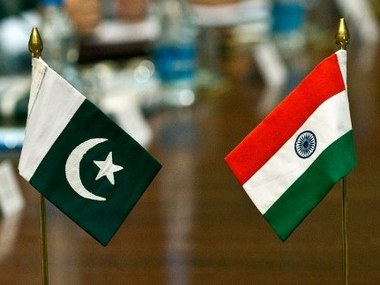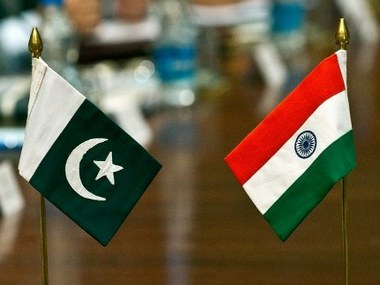The Pakistan conundrum is once again coming to prominence for the Narendra Modi government as it completes eleven months in office this week. Pakistan Prime Minister Nawaz Sharif’s foreign affairs advisor Sartaz Aziz’s questioning of India’s delay in resuming foreign secretary-level talks and his demand to start the process immediately should be seen as Pakistan’s way of pushing the envelope and pressuring the Modi government.[caption id=“attachment_2203090” align=“alignleft” width=“380”]
 No talks yet. AFP[/caption] The question is how India would respond to Pakistan’s demand for resumption of foreign secretary-level talks. Aziz, an old fox in diplomacy, has made a master move and played to the gallery by his reported statement on 19 April asking for resumption of India-Pakistan foreign secretary-level talks at the earliest. This is what he was quoted as saying: “Although the Indian foreign secretary visited Pakistan on March 3 this year but it was ‘a goodwill gesture’. The formal talks have yet to resume… Prime Minister Nawaz Sharif after 2013 general elections had announced an economic and social development roadmap for the country through developing good relations with the neighbours, including India. Under this policy, Mr Sharif went to India and took part in the oath-taking ceremony of Indian Prime Minister Narendra Modi.” Indian diplomatic establishment is well aware of Pakistan’s recent diplomatic shoves. Besides, the Pakistani non-state actors like the designated terrorist Hafiz Mohammed Saeed too have pushed the envelope for India. Saeed, chief of the radical Jamaat-ud-Dawah and 26/11 mastermind, said on 17 April that his outfit supported the efforts of the Pakistan government and army to “help the people of Kashmir”, calling it ‘jihad’. He went on record as remarking thus in an interview to a Pakistani TV network thus: “Jihad is the duty of an Islamic government… there is a government in Pakistan and it has always taken the stand that it is the right of Kashmiris to attain freedom. I say what our army will do to secure the right of Kashmiris is jihad… we extend help to Kashmiris alongside the Pakistani government… we call this jihad." The Modi government is yet to come up with an official reaction to all this. This writer understands that the Modi government won’t be reacting to voices emanating from Pakistan anytime soon. The Indian government is unlikely to come up with an official reaction to any of the developments mentioned above. The earliest opportunity when India may make a Pakistan-specific statement in the light of the above is possible only on 22 April when foreign secretary S Jaishankar is to hold a press briefing. Though his press briefing will be on PM Modi’s just-concluded three-nation tour, other issues like Pakistan would inevitably come up during Q&A. Jaishankar is currently in Washington and is on his way back. The India-Pakistan scoreline may have read India-1, Pakistan-0 when Modi started off his prime ministerial innings on 26 May 2014 when he had his Pakistani counterpart Nawaz Sharif attending his inauguration on his out-of the-box imitative, along with seven other leaders from neighbouring countries. Other friendly neighbours – Saarc countries and Mauritius – did not matter so much after all as the Pakistani PM did in terms of news theatrics. But the situation has mutated much since then. Pakistan is back to its ways of playing mind games and India has to respond. Almost eleven months down the line, Pakistan has recouped, re-energized and re-launched itself. It is evident from the way Aziz has cleverly thrown the ball in the Indian court and accused New Delhi of “inordinate delay” in resuming the stalled foreign secretary-level talks that PM Modi had himself promised soon after his taking over. Ideally, the best course for India would be to ignore Pakistan completely. History has shown that India-Pakistan relationship has more to do with rigid political mindsets on either side rather than anything else. Solving an impossible mathematical puzzle would be much easier than resolving the India-Pakistan tangle. But alas! If wishes were horses! India cannot continue to ignore indefinitely the rising diplomatic chorus for resumption of talks with Pakistan. The international community also has to be kept in good humour and needs to be shown that India is doing its bit in engaging with Pakistan. Pakistan has already tightened screws on India by operationalizing its ‘assets’ in Jammu and Kashmir. Political temperature in Jammu and Kashmir has already started soaring as recent events in the valley corroborate. In the light of the above it would not be wrong to presume that the Modi government is due for unveiling its next steps in its outreach to Pakistan. It is no longer a matter of if, but when!
No talks yet. AFP[/caption] The question is how India would respond to Pakistan’s demand for resumption of foreign secretary-level talks. Aziz, an old fox in diplomacy, has made a master move and played to the gallery by his reported statement on 19 April asking for resumption of India-Pakistan foreign secretary-level talks at the earliest. This is what he was quoted as saying: “Although the Indian foreign secretary visited Pakistan on March 3 this year but it was ‘a goodwill gesture’. The formal talks have yet to resume… Prime Minister Nawaz Sharif after 2013 general elections had announced an economic and social development roadmap for the country through developing good relations with the neighbours, including India. Under this policy, Mr Sharif went to India and took part in the oath-taking ceremony of Indian Prime Minister Narendra Modi.” Indian diplomatic establishment is well aware of Pakistan’s recent diplomatic shoves. Besides, the Pakistani non-state actors like the designated terrorist Hafiz Mohammed Saeed too have pushed the envelope for India. Saeed, chief of the radical Jamaat-ud-Dawah and 26/11 mastermind, said on 17 April that his outfit supported the efforts of the Pakistan government and army to “help the people of Kashmir”, calling it ‘jihad’. He went on record as remarking thus in an interview to a Pakistani TV network thus: “Jihad is the duty of an Islamic government… there is a government in Pakistan and it has always taken the stand that it is the right of Kashmiris to attain freedom. I say what our army will do to secure the right of Kashmiris is jihad… we extend help to Kashmiris alongside the Pakistani government… we call this jihad." The Modi government is yet to come up with an official reaction to all this. This writer understands that the Modi government won’t be reacting to voices emanating from Pakistan anytime soon. The Indian government is unlikely to come up with an official reaction to any of the developments mentioned above. The earliest opportunity when India may make a Pakistan-specific statement in the light of the above is possible only on 22 April when foreign secretary S Jaishankar is to hold a press briefing. Though his press briefing will be on PM Modi’s just-concluded three-nation tour, other issues like Pakistan would inevitably come up during Q&A. Jaishankar is currently in Washington and is on his way back. The India-Pakistan scoreline may have read India-1, Pakistan-0 when Modi started off his prime ministerial innings on 26 May 2014 when he had his Pakistani counterpart Nawaz Sharif attending his inauguration on his out-of the-box imitative, along with seven other leaders from neighbouring countries. Other friendly neighbours – Saarc countries and Mauritius – did not matter so much after all as the Pakistani PM did in terms of news theatrics. But the situation has mutated much since then. Pakistan is back to its ways of playing mind games and India has to respond. Almost eleven months down the line, Pakistan has recouped, re-energized and re-launched itself. It is evident from the way Aziz has cleverly thrown the ball in the Indian court and accused New Delhi of “inordinate delay” in resuming the stalled foreign secretary-level talks that PM Modi had himself promised soon after his taking over. Ideally, the best course for India would be to ignore Pakistan completely. History has shown that India-Pakistan relationship has more to do with rigid political mindsets on either side rather than anything else. Solving an impossible mathematical puzzle would be much easier than resolving the India-Pakistan tangle. But alas! If wishes were horses! India cannot continue to ignore indefinitely the rising diplomatic chorus for resumption of talks with Pakistan. The international community also has to be kept in good humour and needs to be shown that India is doing its bit in engaging with Pakistan. Pakistan has already tightened screws on India by operationalizing its ‘assets’ in Jammu and Kashmir. Political temperature in Jammu and Kashmir has already started soaring as recent events in the valley corroborate. In the light of the above it would not be wrong to presume that the Modi government is due for unveiling its next steps in its outreach to Pakistan. It is no longer a matter of if, but when!
Consulting Editor, Firstpost. Strategic analyst. Political commentator. Twitter handle @Kishkindha.
)